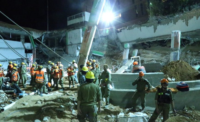The fatal collapse of an underground parking lot in a Tel Aviv commercial district just weeks before construction was due to be completed has not only focused attention on the lack of safety and inspection in Israel’s construction industry but also raised question over potential engineering issues. Police are investigating the cause of the Sept. 5 incident, which killed six construction workers and injured 23 others. The collapse of the four-floor facility is the country’s worst construction event in nearly 20 years.
The $30-million structure was being built by Danya Cebus, a unit of Africa Israel Investments, one of Israel’s largest construction firms, in an area of the city popular with high-tech businesses. Police already have questioned its project managers as well as CEO Ronen Ginsburg. “The focus has been on occupational safety, but the collapse was probably the result of an engineering defect,” he told an emergency session of an Israeli Knesset committee, convened on Sept. 8.
Ginsburg gave no other details, since the investigation remains under a police gag order that bars company officials from public comment. He said Danya Cebus is cooperating with the police probe and has asked one of the country’s top engineering firms to assess all its projects. Varda Edwards, a Labor and Welfare Ministry official, told the committee, “The tragedy … was not a work accident but the result of a very serious planning or design defect.” She said it met standards when inspected in June.
Due to the gag order, a police representative also did not comment but said investigators are working closely with some of the country’s leading civil engineers to determine what led to the structure’s collapse. One Israeli newspaper reported the names of an architect and an engineer it said were involved with the project, but they did not comment and their participation could not be verified. No charges had been filed against any firms involved in the project at ENR press time on Sept. 13.
In 2013, Danya Cebus won the tender for the 17,000-sq-meter project from the municipally owned company that administers and operates city parking facilities. “The original engineering plan for the facility was never used. Instead, Danya Cebus decided to go with their own design,” said one knowledgeable source, who requested anonymity. But Ginsburg vehemently denied the company had decided to have an architect, rather than an engineer, oversee the project as a cost-cutting measure, a claim made in an earlier report by the country’s largest newspaper, Yediot Ahronot.
However, Danya Cebus did confirm that, about two months ago at the same site, a concrete beam collapsed, injuring two workers. Israel police alleged that government supervisors were not sent to inspect that incident, but government officials said they were not aware of it.
Israeli safety advocates and media say that, so far this year, 32 construction-related deaths and 155 injuries have been reported at building sites throughout
Israel. There were 38 deaths last year, they say. “There is a lack of supervision as well as safety at building sites,” said Daniel Shacham, a partner at Yaron, Shimoni & Shacham Consulting Engineers, one of the country’s largest firms. He said the law does not clearly define the powers given to building inspectors.
But Ginsburg told the Knesset committee the accident related to an engineering failure at the site and that it was not a matter of an unsafe construction site. “Danya Cebus’s top priority is safety. We have 12 safety supervisors, more than any other company,” he said. “The problem appears to be … a miscalculation of the load,” said a manager at one top Israeli engineering firm, adding that it is unclear whether that related to use changes made from the structure’s original plan.
Israel’s Economy Ministry, which enforces construction rules, has only 18 supervisors for some 13,000 building sites. The Labor Ministry now is looking into measures to boost inspection at building sites. Eli Allalouf, chairman of the Knesset labor committee, noted pressure on firms to expedite work and dissuade workers from reporting safety issues.



